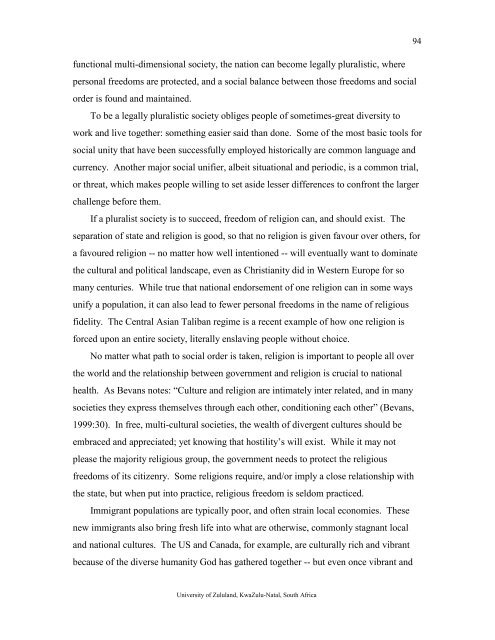Haase_UZ_x007E_DTh (2).pdf - South African Theological Seminary
Haase_UZ_x007E_DTh (2).pdf - South African Theological Seminary
Haase_UZ_x007E_DTh (2).pdf - South African Theological Seminary
You also want an ePaper? Increase the reach of your titles
YUMPU automatically turns print PDFs into web optimized ePapers that Google loves.
94<br />
functional multi-dimensional society, the nation can become legally pluralistic, where<br />
personal freedoms are protected, and a social balance between those freedoms and social<br />
order is found and maintained.<br />
To be a legally pluralistic society obliges people of sometimes-great diversity to<br />
work and live together: something easier said than done. Some of the most basic tools for<br />
social unity that have been successfully employed historically are common language and<br />
currency. Another major social unifier, albeit situational and periodic, is a common trial,<br />
or threat, which makes people willing to set aside lesser differences to confront the larger<br />
challenge before them.<br />
If a pluralist society is to succeed, freedom of religion can, and should exist. The<br />
separation of state and religion is good, so that no religion is given favour over others, for<br />
a favoured religion -- no matter how well intentioned -- will eventually want to dominate<br />
the cultural and political landscape, even as Christianity did in Western Europe for so<br />
many centuries. While true that national endorsement of one religion can in some ways<br />
unify a population, it can also lead to fewer personal freedoms in the name of religious<br />
fidelity. The Central Asian Taliban regime is a recent example of how one religion is<br />
forced upon an entire society, literally enslaving people without choice.<br />
No matter what path to social order is taken, religion is important to people all over<br />
the world and the relationship between government and religion is crucial to national<br />
health. As Bevans notes: “Culture and religion are intimately inter related, and in many<br />
societies they express themselves through each other, conditioning each other” (Bevans,<br />
1999:30). In free, multi-cultural societies, the wealth of divergent cultures should be<br />
embraced and appreciated; yet knowing that hostility’s will exist. While it may not<br />
please the majority religious group, the government needs to protect the religious<br />
freedoms of its citizenry. Some religions require, and/or imply a close relationship with<br />
the state, but when put into practice, religious freedom is seldom practiced.<br />
Immigrant populations are typically poor, and often strain local economies. These<br />
new immigrants also bring fresh life into what are otherwise, commonly stagnant local<br />
and national cultures. The US and Canada, for example, are culturally rich and vibrant<br />
because of the diverse humanity God has gathered together -- but even once vibrant and<br />
University of Zululand, KwaZulu-Natal, <strong>South</strong> Africa

















